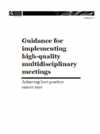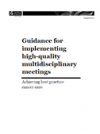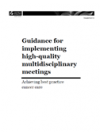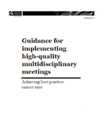MDMs are deliberate, regular meetings either face-to-face or via videoconference at which health professionals with expertise in a range of different specialities discuss the options for patients’ treatment and care prospectively. Prospective treatment and care planning involves making recommendations in real time, with an initial focus on the patient’s primary treatment. MDMs facilitate a holistic approach to the treatment and care of the patient.
International evidence shows that multidisciplinary care is a key part of providing best-practice treatment and care for patients with cancer. Multidisciplinary care involves a team approach to planning treatment and providing care for cancer patients as they move along the pathway of services they need.
MDMs are part of the philosophy of multidisciplinary care. Effective MDMs have positive outcomes for patients receiving the care and for the health professionals involved in providing the care and health services. Some of the benefits are that:
- treatment planning is improved because health professionals consider the full range of therapeutic options, which improves outcomes
- improved equality of outcomes for patients with cancer
- more patients are offered the opportunity to take part in relevant clinical trials
- there is greater continuity of care and less duplication of services
- services are better coordinated
- communication between care providers improves, as clear lines of responsibility are developed between members of the multidisciplinary meetingtime and resources are used more efficiently.
Purpose
This guidance document provides a framework and toolkit to support district health boards (DHBs) in establishing and implementing high-quality MDMs.It does not propose a ‘one size fits all’ approach to MDMs. Instead, it recognises the need for a structured approach in which MDMs match the mix of services and the nature of service delivery and access particular to each region in New Zealand.
DHBs are encouraged to consider solutions that include establishing regional MDMs across the tumour types. Smaller DHBs can then participate in the regional MDMs, whose broad selection of members will have sufficient time and expertise across the core disciplines involved. DHBs are encouraged to work with their regional cancer centre DHB and regional cancer network to determine which MDMs to hold locally, regionally and supra-regionally.
If MDMs are to be of high quality, DHBs need to recognise the participation of health professionals in MDMs as part of job sizing, position descriptions and position reviews.
This guidance document was developed with input from the four regional cancer networks. It will be reviewed annually.




